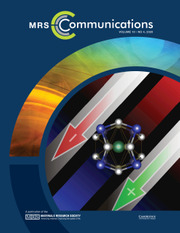No CrossRef data available.
Article contents
Integrating exploratory data analytics into ReaxFF parameterization
Published online by Cambridge University Press: 18 September 2018
Abstract
We present a systematic approach to refine hyperdimensional interatomic potentials, which is showcased on the ReaxFF formulation. The objective of this research is to utilize the relationship between interatomic potential input variables and objective responses (e.g., cohesive energy) to identify and explore suitable parameterizations for the boron carbide (B–C) system. Through statistical data analytics, ReaxFF's parametric complexity was overcome via dimensional reduction (55 parameters) while retaining enough degrees of freedom to capture most of the variability in responses. Two potentials were identified which improved on an existing parameterization for the objective set if interest, showcasing the framework's capabilities.
Information
- Type
- Research Letters
- Information
- Copyright
- Copyright © Materials Research Society 2018


